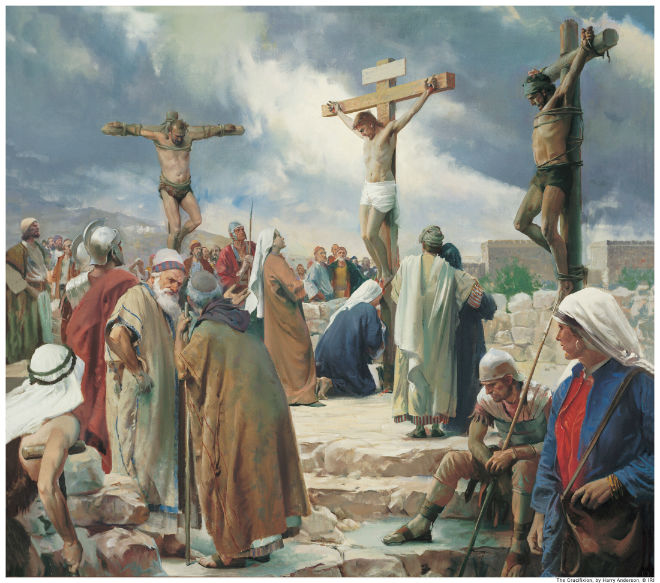Although there are several biblical references to this event, which occurred when Jesus Christ was already crucified, I will stick to the Gospel according to John, which in chapter 19 reads as follows:
Then, knowing that all things were now accomplished, and that the scripture might be fulfilled to the end, Jesus said, "I am thirsty.
There was a basin full of vinegar; they soaked a sponge in it, tied it to a branch of hyssop, and put it to his mouth.
When they had drunk the vinegar, Jesus said, "All things have been fulfilled". And bowing his head, he gave up his spirit.
Without going into the intention of those who offered it to him or the meaning of Jesus' words beyond the literal, this story has to do with vinegar, or rather, supposed vinegar. What was a "vessel full of vinegar" doing there? The answer to this question is much simpler if we think that it was not vinegar but posca.
If previously we talked about the best wines of Antiquity, in this one we are going to talk about what nowadays we would call "wines with a pellicle". Posca was a drink made by mixing water and crushed or vinegary wine. Normally, it was the wine consumed by citizens who could not afford a higher quality wine and, above all, by the legions of Rome in their many campaigns of conquest throughout the known world. And although it tasted rather unpleasant, it had several advantages over wine: it was very cheap, there was no danger of spoilage - it was already stale - and it was the safest way to drink water (the Egyptians used wine as an antiseptic and the Persians used it as a germicide). So, as Jesus Christ was guarded on the cross by Roman soldiers, it is easier to place a "vessel full of posca" than a "vessel full of vinegar" in this scene.
Curiously, and as a result of excessive devotion and smoke peddlers who wanted to make a profit, the sponge and the branch of hyssop with which the soldiers gave him the posca are preserved as relics of the Passion of Christ (?). The sponge, divided into several parts, is venerated in the Holy Chapel in Paris, in the Basilica of the Escorial, and in the Basilicas of St John Lateran, St Mary Major and St Mary Trastevere in Rome.
In addition to being the drink that accompanied the legions, posca was also used as an ingredient in some of the recipes that Marcus Gavius Apicius included in De re coquinaria, an authentic treatise on gastronomy in ancient Rome:
Panem Alexandrinum excavabis, in posca macerabis. Adicies in mortarium piper, mel, mentam, alium, coriandrum viridem, caseum bubulum sale conditum, aquam, oleum. Insuper nivem et inferes (A loaf of Alexandria bread is hollowed out, macerated in posca. In a mortar put pepper, honey, mint, garlic, fresh coriander, cow's cheese seasoned with salt, water, oil. Cover with snow and serve.)


















I think it is a lot of pretence to go against what the evangelists wrote. They should have known the posca as well and therefore made the difference between one thing and another.
I would like to know if it is possible for me to have access to books or magazines written on paper about the stories on this page. I like it very much as it is a story that I share because of the different way of analysing the events.
In my childhood in the north of the province of Zaragoza, the "posca" was a normal drink: the botijo was filled with fresh water from the well and, depending on the occasion, half a glass of vinegar or rancid wine was added. Also dry chinchón. It was very refreshing. And I'm not talking about the Middle Ages: this was the norm in the late sixties, and I would bet that the older people still do it this way in summer.
"acetum cum acua mixtum" - this is the term used in ancient times for the drink that the author of this note "DESACERTLY" indicates as "Posca" and this, as the drink given to Jesus Christ before his death...the truth is that: the historical name of the drink referred to is "POTO CONDITUS" (Lat) or " POSCA EPOXOS" (gr,.) which means something like "spicy and / or lively drink" and this derived from the AVINAGRATED VINE MUST mixed WITH WATER...this drink was widely used by the Roman army and by the lower classes of the Roman imperial antiquity. the historical records indicate that this drink was popular and consequently known in characteristics. Now, it is worth noting that the Bible, as we know it today, was written in 3 main languages "Aramaic", "Hebrew" and the New Testament in mainly "Greek". (plus a few words in "latin")... and it is the only testimony about the fact referenced by the author of the note. And if he is trustworthy to the mentioned reference, the author should consider that in the original greek text mentioning this drink given to Jesus Christ on the cross uses the term "OXOS"... which means VINEGAR...vinegar (oxos..) for those who have a low intellect of reading and historical research was used in crucifixions as in all kinds of physical torture sessions and was also used in battles... ,,,, as vinegar (oxos; Lat.) was used to clean the blood from the "leathers" used in the military uniforms of those times, helmets, weapons (as part of the hygiene and military presence)...likewise it was the product used by the Roman soldiers to clean the blood from their bodies and also mixed with spices and used as a balsam for massages and even as medicinal drinks (depending on the herbs used...),,, well, I do not want to be extensive in the consideration, since I could well... I only consider that the pretension of publishing notes appearing to be suitable and with an intellectual touch that in the case of THIS NOTE not only DOES NOT EXIST...but the lack of knowledge about historical details lead me to consider the author of the note as a simple INTELLECTUALOID without CONTENT or HISTORICAL / SCIENTIFIC reference TO BACK UP HIS STATEMENTS... as to write in a public medium what this same guy thinks it was with respect to the historical fact mentioned. in fin.... write ANYONE WRITES TODAY... it is only my point of view... since as a personal principle I do not speak, NOR WRITE about what I DO NOT KNOW... and at some point it bothers me that someone wants to pass himself off as an intellectual or knowledgeable when the REALITY is that one is reading an IGNORANT OF THE SUBJECT IN QUESTION... Juan Carlos Medina.
Hello José,
Translations and interpretations of the Bible over the centuries may have simplified this common Roman drink, the posca, to a shortened version of its description, simply mentioning "vinegar". However, this article is not meant to disprove the biblical explanations but to bring to light this popular drink so widely consumed among the Roman legions.
Thank you for participating in the blog, best regards!
Hello Maria,
If you are referring to books by the author of the article, Javier Sanz, you can consult them here: http://historiasdelahistoria.com/mis-libros
To find out more about the publications of the publishing house Vivanco, you can visit this page: http://vivancoculturadevino.es/es/fundacion/editorial/
Best regards 🙂
Good afternoon.
The article is only intended to make known the posca, the drink consumed by the legions and the lower classes (the name by which Pliny, Apicius or Suetonius call this drink, since "acetum cum acua mixtum" is the definition; just as we can define gazpacho as "cold soup made with olive oil, vinegar and raw vegetables"). Similarly, in previous articles I have spoken of sapa or quality wines such as Falerno or Commandaria, just as I could have spoken of mulsum. I thought it was right to use the biblical passage as it seemed logical to me that it would have been posca that was given to Jesus as it was the brew consumed by the soldiers of Rome (remember that they guarded the crucified). Regarding the Bible, I assume you are referring to the Vulgate (the Latin translation of the Hebrew and Greek), we are talking about translations. So, if you like, I propose a game: look for the apple that Eve bit... see if you can find it.
Indeed, to write on the web does not require a licence, nor does it require a minimum cultural background. If I did, I would only be able to present my love of reading and, above all, of history.
As for "intellectualoid", I will tell you that I consider myself a lucky guy, nothing more. But since you allow yourself to "brand" me as something, without even having shared a table and tablecloth, I will tell you my experience on the net so that you have more arguments. Seven years ago I started writing a blog with the sole aim of sharing one of my hobbies, history (because you will have realised that I am not a historian, just a history buff). Later, I decided to go a little further: to try to reconcile history with those who put it aside for being boring and boring. Thanks to the followers, those who comment and share the articles, the blog began to gain prominence and I was lucky enough to publish books, write in newspapers and magazines, collaborate in several radio programmes, have the opportunity to write in blogs such as Vivanco, a reference in the dissemination and cultural activities, and even direct a digital and interactive history magazine. As long as I have projects to develop, continue to enjoy looking for stories to tell and people still want to read or listen to them, I will continue to be here. When any of these conditions are not met, I will throw the shutters down, pick up my straw hat and my botijo and retire to my little village to enjoy my animals and my vegetable garden. Now you have more data to judge me.
Best regards.
Remember that the gospels were not written by the evangelists, but by other people until a hundred years later, on the basis of what the evangelists said. It is more logical what is proposed here, that it was Posca (Roman word), not far from vinegar (more common word and according to the Jewish mentality) but however it was, it does not change the idea at all...
In all humility, and as a history buff, I have to say that at least in my case the author's objectives have been fully satisfied. It gives me a moment of enjoyment, and a welcome break from the daily grind. Hence, I fail to see the need to enter into byzantine discussions about some detail that obviously none of those who experienced it first hand will be kind enough to clarify for us. I do not question Mr. Medina's extensive knowledge, but I think the tone is a little out of place. The polite does not take away the brave.
Regards, I hope I wasn't too much of a bore.